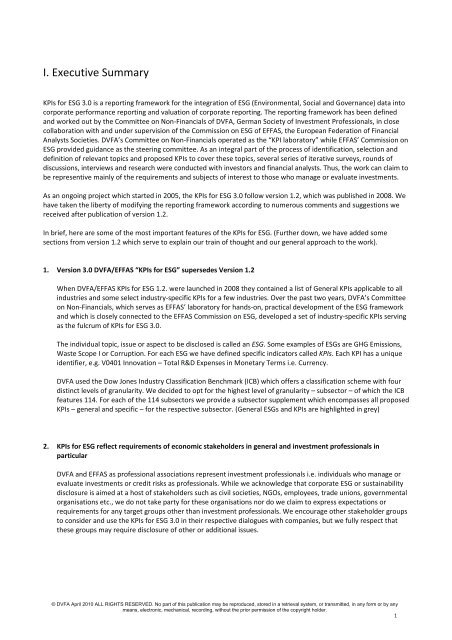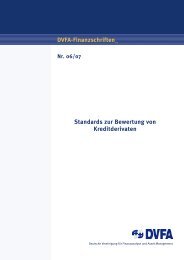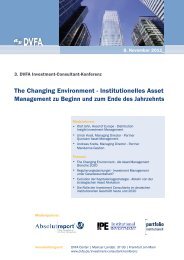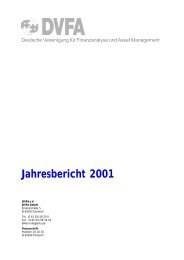KPIs for ESG - DVFA
KPIs for ESG - DVFA
KPIs for ESG - DVFA
You also want an ePaper? Increase the reach of your titles
YUMPU automatically turns print PDFs into web optimized ePapers that Google loves.
I. Executive Summary<br />
<strong>KPIs</strong> <strong>for</strong> <strong>ESG</strong> 3.0 is a reporting framework <strong>for</strong> the integration of <strong>ESG</strong> (Environmental, Social and Governance) data into<br />
corporate per<strong>for</strong>mance reporting and valuation of corporate reporting. The reporting framework has been defined<br />
and worked out by the Committee on Non-Financials of <strong>DVFA</strong>, German Society of Investment Professionals, in close<br />
collaboration with and under supervision of the Commission on <strong>ESG</strong> of EFFAS, the European Federation of Financial<br />
Analysts Societies. <strong>DVFA</strong>’s Committee on Non-Financials operated as the “KPI laboratory” while EFFAS’ Commission on<br />
<strong>ESG</strong> provided guidance as the steering committee. As an integral part of the process of identification, selection and<br />
definition of relevant topics and proposed <strong>KPIs</strong> to cover these topics, several series of iterative surveys, rounds of<br />
discussions, interviews and research were conducted with investors and financial analysts. Thus, the work can claim to<br />
be representive mainly of the requirements and subjects of interest to those who manage or evaluate investments.<br />
As an ongoing project which started in 2005, the <strong>KPIs</strong> <strong>for</strong> <strong>ESG</strong> 3.0 follow version 1.2, which was published in 2008. We<br />
have taken the liberty of modifying the reporting framework according to numerous comments and suggestions we<br />
received after publication of version 1.2.<br />
In brief, here are some of the most important features of the <strong>KPIs</strong> <strong>for</strong> <strong>ESG</strong>. (Further down, we have added some<br />
sections from version 1.2 which serve to explain our train of thought and our general approach to the work).<br />
1. Version 3.0 <strong>DVFA</strong>/EFFAS “<strong>KPIs</strong> <strong>for</strong> <strong>ESG</strong>” supersedes Version 1.2<br />
When <strong>DVFA</strong>/EFFAS <strong>KPIs</strong> <strong>for</strong> <strong>ESG</strong> 1.2. were launched in 2008 they contained a list of General <strong>KPIs</strong> applicable to all<br />
industries and some select industry-specific <strong>KPIs</strong> <strong>for</strong> a few industries. Over the past two years, <strong>DVFA</strong>’s Committee<br />
on Non-Financials, which serves as EFFAS’ laboratory <strong>for</strong> hands-on, practical development of the <strong>ESG</strong> framework<br />
and which is closely connected to the EFFAS Commission on <strong>ESG</strong>, developed a set of industry-specific <strong>KPIs</strong> serving<br />
as the fulcrum of <strong>KPIs</strong> <strong>for</strong> <strong>ESG</strong> 3.0.<br />
The individual topic, issue or aspect to be disclosed is called an <strong>ESG</strong>. Some examples of <strong>ESG</strong>s are GHG Emissions,<br />
Waste Scope I or Corruption. For each <strong>ESG</strong> we have defined specific indicators called <strong>KPIs</strong>. Each KPI has a unique<br />
identifier, e.g. V0401 Innovation – Total R&D Expenses in Monetary Terms i.e. Currency.<br />
<strong>DVFA</strong> used the Dow Jones Industry Classification Benchmark (ICB) which offers a classification scheme with four<br />
distinct levels of granularity. We decided to opt <strong>for</strong> the highest level of granularity – subsector – of which the ICB<br />
features 114. For each of the 114 subsectors we provide a subsector supplement which encompasses all proposed<br />
<strong>KPIs</strong> – general and specific – <strong>for</strong> the respective subsector. (General <strong>ESG</strong>s and <strong>KPIs</strong> are highlighted in grey)<br />
2. <strong>KPIs</strong> <strong>for</strong> <strong>ESG</strong> reflect requirements of economic stakeholders in general and investment professionals in<br />
particular<br />
<strong>DVFA</strong> and EFFAS as professional associations represent investment professionals i.e. individuals who manage or<br />
evaluate investments or credit risks as professionals. While we acknowledge that corporate <strong>ESG</strong> or sustainability<br />
disclosure is aimed at a host of stakeholders such as civil societies, NGOs, employees, trade unions, governmental<br />
organisations etc., we do not take party <strong>for</strong> these organisations nor do we claim to express expectations or<br />
requirements <strong>for</strong> any target groups other than investment professionals. We encourage other stakeholder groups<br />
to consider and use the <strong>KPIs</strong> <strong>for</strong> <strong>ESG</strong> 3.0 in their respective dialogues with companies, but we fully respect that<br />
these groups may require disclosure of other or additional issues.<br />
© <strong>DVFA</strong> April 2010 ALL RIGHTS RESERVED. No part of this publication may be reproduced, stored in a retrieval system, or transmitted, in any <strong>for</strong>m or by any<br />
means, electronic, mechanical, recording, without the prior permission of the copyright holder.<br />
1

















